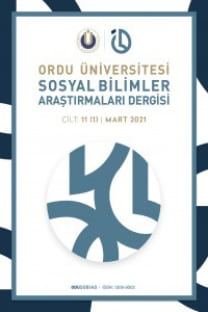Pragmatizmde Meliorizm ve Sosyal Umut Kavramı: Richard Rorty’ nin Yeniden Yorumlaması
Geleceğin ortak insan çabalarıyla daha iyi olacağı anlamına gelen Meliorizm kavramı, pragmatist düşünür ve filozofların ilgisini çekmiştir. William James, John Dewey, Ralph Waldo Emerson ve Richard Rorty, pragmatizmde Meliorizm'i vurgulayan önemli filozoflardır. Rorty, pragmatist düşünme biçimini iki boyuta odaklanarak yeniden yorumlamıştır. Geleneksel felsefeyi eleştirirken, pragmatizmin toplumda entelektüel kültür yaratmadaki rolüne dikkat çeker. Rorty'nin pragmatizm anlayışı, temsil karşıtı, özcülük karşıtı, temelcilik karşıtı, deneysel, umutlu ve ileriye dönük olarak tanımlanabilir. Bu çalışmanın amacı, Richard Rorty'nin meliorizm üzerine inşa ettiği sosyal umut felsefesini keşfetmektir. Rorty sosyal umuda erişmek için beş tür duygunun önplana çıktığı sosyal umut teorisi geliştirmiştir. Bu duygular hayal gücü duygusu, belirsizlik duygusu, iletişim duygusu, öz farkındalık duygusu ve öz saygı duygusudur. Rorty, bu beş duyguya sahip olan insanların umut ve beklenti içinde daha ileri görüşlü olarak geleceğe bakacağını söyler. Rorty bireylere umutla geleceğe odaklanıp ve geçmişi atlamayı önerir.
Anahtar Kelimeler:
pragmatizm, sosyal umut, meliorism
Meliorism and Social Hope in Pragmatism: Richard Rorty’s Reinterpretations
The concept of meliorism which means future would be better with joint human efforts has drawn attention of pragmatist thinkers and philosophers. William James, John Dewey, Ralph Waldo Emerson and Richard Rorty are important philosophers placing an emphasis on Meliorism in pragmatism. Rorty has reinterpreted the pragmatist way of thinking focusing on two dimensions. As he criticises traditional philosophy, he draws attention to the role of pragmatism in creating intellectual culture in society.Rorty’s understanding of pragmatism may be described as anti-representialist, anti- essentialist, anti- foundationalist, experimentalist, hopeful, and forward-looking. The purpose of this study is to explore Richard Rorty’ s philosophy of social hope building on meliorism. He has proposed a social hope theory building in which he underlines the importance of the five types of emotions to access social hope. These include sense of imagination, sense of uncertainty, sense of communication, sense of self-awareness and sense of self-respect. Rorty suggests that people who have the five emotions may be forward-looking, which is a combined emotion of hope, anticipation, and something enjoyable in the future. He recommends individual focusing on future with hope and skip the past.
Keywords:
Pragmatism, social hope, meliorism,
___
- Gibbs,P &Costley, C.( 2012). The community of workers’university: A pragmatic Institution for the Future ? Higher Education Quarterly,66 (1), 90-105. King, R. H. (1985). In Other Words": The Philosophical Writings of Richard Rorty Journal of American Studies,19 (1 ), 95-103. Mendieta, E. ( 2006). Take care of freedom and truth will take care of itself, Stanford University Press, Stanford, CA
- ISSN: 1309-9302
- Yayın Aralığı: Yılda 3 Sayı
- Başlangıç: 2010
- Yayıncı: -
Sayıdaki Diğer Makaleler
Ali Sami Boyar’ın Ayasofya Konulu Eserlerinin İncelenmesi
Aydın Müzesi’nden Bir Grup Cam Eser
Örgütsel Meşruiyet Aracı Olarak Kurumsal Sosyal Sorumluluk Uygulamaları: Koza Maden İşletmesi Örneği
Toplum 5.0 Bağlamında Mutluluk ile İlişkilendirilen Faktörlerin Panel Veri Kanıtları
Gökçen AYDINBAŞ, Zeynep ERDİNÇ
Covid-19 Salgın Sürecinde Toplumsal ve Dini Yaşamın Dönüşümü: Psikososyal Bir Analiz
''Dunning Kruger Effect'' Teorisinin Piyasa Bilinirliği
Gümüşhacıköy’ün Gümüş Beldesi’ndeki Hagios Georgios Kilisesi: Yeni (Maden) Camii
Orta Asya Türk Cumhuriyetlerinin Demografik Yapısında Ruslar
